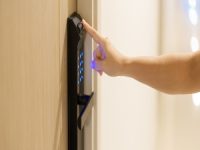Fingerprint locks, also known as biometric locks, have gained in popularity recently as a convenient and secure choice to traditional key-based or keypad locks.
Pros of fingerprint locks:
- Improved Security: Fingerprint locks supply a higher level of security by using biometric data (fingerprints) that are unique to everyone. Unlike keys or codes that can be lost, stolen, or duplicated, fingerprints are very difficult if not virtually impossible to replicate. This ensures that only authorized individuals with registered fingerprints can gain access, minimizing the risk of unauthorized entry.
- Convenience and Speed: With a fingerprint lock, there is no need to carry keys or remember codes. Your fingerprint is always with you, making access to your home or office quick and hassle-free. This convenience is especially beneficial in situations where you have your hands full.
- User Management: Fingerprint locks often come with features that allow you to easily add or remove authorized users. This is particularly useful in settings where multiple people need access, such as offices or rental properties. User management capabilities enable you to keep control over who has access to your space and streamline the process of granting or taking away access privileges.
- Audit Trail: Many fingerprint locks come equipped with an audit trail feature. This feature records the dates and times of access attempts and successes. This can be valuable for security purposes, as it supplies a digital record of who entered and when. In case of a security breach or incident, the audit trail can help with investigations and provide valuable information.
Cons of fingerprint locks:
- Cost: Fingerprint locks tend to be more expensive than traditional locks, primarily due to the advanced technology involved. The cost of purchasing and installing fingerprint locks can be higher upfront compared to conventional lock systems. However, it's worth considering the long-term benefits and increased security they provide.
- Physical Changes: Fingerprint recognition technology relies on reading the patterns on your fingertips. While this is generally reliable, certain physical changes like cuts, burns, or dry skin can potentially affect the accuracy of the fingerprint scan. Additionally, factors such as aging or certain medical conditions may cause changes in fingerprints over time. While modern fingerprint locks are designed to handle these variations, occasional issues may occur.
- Visitors: If you frequently have visitors who require temporary access to your space, using a fingerprint lock may not be the most convenient option. Unlike sharing a key or providing a temporary code, registering temporary fingerprints can be more complicated and time-consuming. In such cases, you may need to consider providing different security or access methods.
- Power Dependency: Most fingerprint locks require a power source, like batteries or a direct electrical connection. If the power source fails, it can result in the lock becoming non-functional. It is essential to regularly check and replace batteries or ensure a backup power source is available to avoid lockouts.
Fingerprint locks offer a higher level of security, convenience, and user management capabilities. They eliminate the need for physical keys or codes, providing quick and easy access. However, they come with a higher upfront cost, can be vulnerable to certain physical changes, may not be ideal for frequent visitor access, and require a power source. Studying your specific security requirements and weighing the pros and cons will help you decide if fingerprint locks are the right choice for your home or business.


